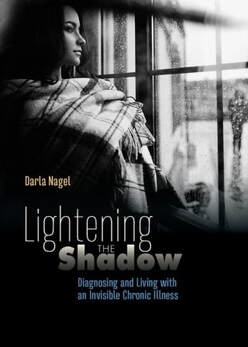|
What inspired this book? I asked myself, "What might have happened if my sister-in-law and brother had accepted my offer to be a surrogate for them?" So yes, this narrative is personal to me and is inspired by, though not based on, a real couple’s experience with infertility and cancer. Second, I think it's ridiculous that surrogacy is illegal in Michigan and want to support its legalization. Third, I have been curious about pregnancy and the first stages of life from a young age, and "giving birth to" a book rather than a baby is within my abilities and comfort zone. The Sisterhood of Motherhood is for women who are interested in surrogacy and for people who believe love can overcome family problems and believe that infertility isn’t the end but rather the beginning. Darla Nagel is a biomedical copy editor who has an invisible chronic illness. She wants to educate healthcare professionals and encourage patients. If you want to receive quarterly updates from her, email darla.nagel{a}gmail.com.
0 Comments
Yes! After I publish my second book in 2024, I'll still call my blog “Lightening the Shadow.” My second book, a novel tentatively titled The Sisterhood of Motherhood, will shine a light on the experiences of couples with infertility and resulting depression. My first book, a memoir, shone a light on the experiences of young adults with disabling invisible chronic illnesses. I'm still shining lights on disease and health in this blog and all my writing. Readers can expect the same name and similar content here in 2024 as in 2023. Merry Christmas to you all!
Many couples decide adoption is not what they desire or can afford. But what if there were a way to adopt and still experience pregnancy and newborn care, plus save an innocent life from destruction? There is: embryo adoption. In vitro fertilization (IVF) can generate more embryos than a couple is willing to carry. We’re up to over a million tiny babies on ice. Organizations work to match couples who are willing to adopt other couples’ embryos. It’s a beautiful solution, one worth promoting. It’s a solution I’ll mention in my upcoming novel. It’s a solution I pray God blesses. Darla Nagel is a biomedical copy editor who has an invisible chronic illness. She wants to educate healthcare professionals and encourage patients. If you want to receive quarterly updates from her, email darla[dot]nagel[a]gmail.com.
I threw away my benzoyl peroxide acne cream a couple of weeks ago, and so far, I see no difference in the amount or type of zits on my face, back, and chest. I didn't have bad acne as a teen, but I did, suddenly, in my twenties. Maybe all the acne creams, and diet changes, I tried this past decade were a waste of time, as someone with a systemic chronic illness affecting immunity. But as a young woman in a country highly valuing beauty, I felt pressure to keep trying. Now, I say if you want to leave your acne alone, leave it alone. If it's part of you, be you. Don't waste money, energy, and time changing something if it can't be changed. That's the gist, but if you're curious about my late-onset acne, here's how it started, as recorded in my book: I faced a challenge to my more positive attitude when a new symptom began in June. At first, I thought it was a rash on my face. But as it emerged on my chest, upper arms, neck, and back, I examined it, discovering it was acne, the worst acne I’d ever had. Each new spot took about a month to fade. I tried several over-the-counter creams and diluted tea tree oil, a natural remedy I’d found online, but none worked. Suddenly, I looked fifteen instead of twenty-one. I’d always been thankful that my illness hadn’t affected my appearance or made people stare at me. Now my appearance had changed so much that for the first time, I wanted to wear makeup besides lip gloss and was embarrassed to be seen in a swimsuit. Darla Nagel is a biomedical copy editor who has an invisible chronic illness. She wants to educate healthcare professionals and encourage patients. If you want to receive quarterly updates from her, email darla.nagel{a}gmail.com.
The Friday before Mother’s Day 14 years ago, I felt like I was coming down with something. A week later, as I wrote in my book: I don’t feel tired; I feel stunned on the ground from body slamming a brick wall. I feel fifty years older. I feel unplugged in the dark. That’s how I felt while combing my hair in the YMCA locker room after one of my hour-long swims. What I actually thought was Maybe this is more than a cold. I’m whipped, and my legs are sore, even though I didn’t swim as hard today. Usually, swimming made me feel calm and strong, without causing sweating, even after the two-hour practices I’d done on my high school swim team….But I’d had this cold, which was mild except for utter exhaustion that made me not want to do anything involving physical or cognitive effort…. I didn’t learn my diagnosis until two years and five months had passed and my condition had worsened. Two years represented a tenth of my life. Falling ill at age nineteen was like having my wings chopped off just as I was taking flight. Maybe the timing would’ve been worse if they had been chopped when I was hundreds of feet in the air, a year into a career in a city far from my parents. But I would’ve liked to soar through the air. If that sounds like the start of a story about long COVID, you’re partially right. Long COVID and ME/CFS have much in common, chiefly, an overwhelming and flawed bodily response to a virus. ME/CFS is just as real and just as detrimental. Even after 14 years, some people don’t know what ME/CFS is and don’t know that I’ve written a book that is meant to help young people living with any invisible chronic illness. Don’t spend another 14 years in the dark. Read my book for a personal lesson, or see the Resources section for online information. Darla Nagel is a biomedical copy editor who has an invisible chronic illness. She wants to help other patients and enlighten health care professionals about our experiences. If you’d like to receive quarterly updates from her, sign up by emailing darla.nagel {a} gmail.com.
A quick guide to the benefits of a plant-based diet or vegan diet for health, for the environment, and even for your grocery budget can be found in Natural Awakenings. Click here to read "Veggies for the Win." Darla Nagel is a biomedical copy editor who has an invisible chronic illness. She wants to educate healthcare professionals and encourage patients. If you want to receive quarterly updates from her, email darla{dot}nagel{a}gmail.com.
I used to think inability to reproduce naturally didn’t constitute a physical disability. Now I think infertility is a physical and emotional disability for both husband and wife. It carries a high emotional and financial toll with so many uncontrollable factors. I never thought IVF would take place in my Christian family, but now it has, with all of its hurdles and doctors and needles. The couple within my family is now at the second-to-last hurdle: a “lining check” to see whether embryo implantation should be attempted. I am praying for the best outcome for this couple and their “snowflake babies.” Join me in this prayer and in appreciation of the gift of life from our Creator. Darla Nagel is a biomedical copy editor who has an invisible chronic illness. She wants to educate healthcare professionals and encourage patients. If you want to receive quarterly updates from her, email darla{dot}nagel{a}gmail.com.
For the first time, I edited subtitles on a company YouTube video to better reflect what the speaker and interviewer said. I've wanted to make my company's content more accessible for some time, and it was easy to learn how to use YouTube's subtitle editor tool. One video down, about 160 more to go. Some of the speakers are going to have heavy accents or discuss specific scientific terminology, meaning auto-generated subtitles won't be sufficient. I'm excited to make each subtitle accessible for people who prefer captioned videos. In the past month, I also educated a local publisher on what alt text is and is for. Alt text is not something my company is adding to content, but for companies with the human and technology resources to add it, alt text is another important accessibility action item. If my own website is missing some accessibility feature, please let me know in a comment! Darla Nagel is a biomedical copy editor who has an invisible chronic illness. She wants to educate healthcare professionals and encourage patients. If you want to receive quarterly updates from her, email darla.nagel{a}gmail.com.
Here's a new study on the role of Epstein-Barr virus and human herpesvirus 6 in ME/CFS, specifically by altering germinal center and extrafollicular antibody responses. I copyedited this. It has a helpful Graphical abstract (explanatory diagram). See the full article here: https://insight.jci.org/articles/view/158193 It is wonderful to see more research coming out on ME. This is the second such study I have copyedited this year. Darla Nagel is a biomedical copy editor who has an invisible chronic illness. She wants to educate healthcare professionals and encourage patients. If you want to receive quarterly updates from her, email darla.nagel{a}gmail.com.
When dealing with disease, our desperation for improvement can lead us to quack medicine, junk science, snake oil…choose your poison. It’s not a new problem, so why does it continue? According to Tim Harford in “Why Phoney Medicine Has Such Lasting Allure,” “I cannot help but draw a broader political lesson from the long history of demand for quackery. When we feel that things are not going well and that experts have been unable to help, we seek more speculative remedies, even if we do not expect much. When those remedies fail, we become more desperate, and we keep searching. There is always another charlatan around the corner.” Read the full article on quack medicine here. One quack told me my disease was in my head. Another quack (at the University of Michigan!) told me being more positive would help. A third prescribed me about a thousand dollars’ worth of supplements — I was swallowing 13 tablets a day — that did nothing, leading him to prescribe me aloe juice. Quackery is a vicious cycle. Don’t be swallowed by it or swallow everything healthcare professionals give you. Darla Nagel is a biomedical copy editor who has an invisible chronic illness. She wants to educate healthcare professionals and encourage patients. If you want to receive quarterly updates from her, email darla.nagel{a}gmail.com.
|
Author:
|




 RSS Feed
RSS Feed